Do you know why pimples come on your face? Pimples start from too much oil, clogged pores, germs, and redness. Hormones, genes, meds, health, and lifestyle can make it worse. Knowing these helps stop pimples and have nice skin. Learn more about Acne Vulgaris and how to treat it for beautiful skin.
Key Takeaways
- Knowing the several types of acne can help you find the right treatment.
- It’s super important for doctors to spot the signs of acne, a skin condition, early to help treat it and prevent keloid scarring.
- Taking care of your hormones and genes can help stop and control acne.
- Knowing what can make acne worse in grown-ups, such as stress, and some medicines, can help you do things to prevent it from getting worse.
- Understanding why acne happens and what causes it can help people change their daily habits for better skin.
- It’s important to find acne early and treat it well to help the skin stay healthy.
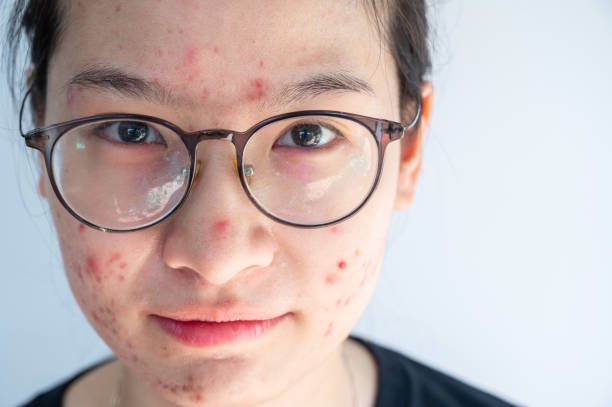

Types of Acne Vulgaris
Common Acne
Acne happens during puberty because of hormones. It may cause acne vulgaris, blackheads, whiteheads, and pimples on the face, chest, and back due to Cutibacterium acne. Too much oil is the main reason.
To treat acne, dermatology patients may use topical treatments like creams with benzoyl peroxide or salicylic acid, oral isotretinoin, and retinoids for skin care. They help beautiful skin. Eating well and taking care of your skin may make it better.
Cystic Acne
Cystic acne is a bad kind of acne with big, painful cysts under the skin. It can leave scars if not treated. It happens because of genes and hormones.
Dermatologists may give pills like isotretinoin for bad acne. These pills help stop oil and create new pimples. Sometimes, shots are needed for unbelievably bad acne to calm down redness fast.
Nodular Acne
Nodular acne, also known as cysts or lesions, is big, hard bumps under the skin that hurt when you touch them and may affect dermatology patients, causing scarring. It can stick around for a long time because of hormones and genes.
If you have big pimples or acne vulgaris with pus, a chronic skin disease, it’s important to see a dermatologist. They might give you prescription medications, oral medications, antibiotics, or corticosteroid injections as treatment options to help. Also, having a good routine for washing your face can help keep your skin healthy.
Symptoms and Clinical Features
Signs and Symptoms
Acne is when your skin gets blackheads, whiteheads, pimples, cysts, and lesions on your face, neck, chest, and back. This happens because your skin makes too much sebum, and pores get blocked due to acne vulgaris. Your skin might look red, swollen, and hurt because of inflammation.
Sometimes, people get big pimples that hurt and can leave keloid scarring if not taken care of. They can also get pus-filled pimples called pustules. These things can make someone feel bad about themselves, causing complications in their life et al.
Clinical Features in Different Skin Types
People with oily skin get lots of acne because they produce too much sebum. Dry skin has less acne but can get dry patches. People with combination skin have oily and dry parts on their face and it’s hard to take care of both.
When I had acne, I learned that knowing my skin type helped me pick the right skincare stuff. A skin doctor told me to use non-clog things to stop pores from getting blocked.
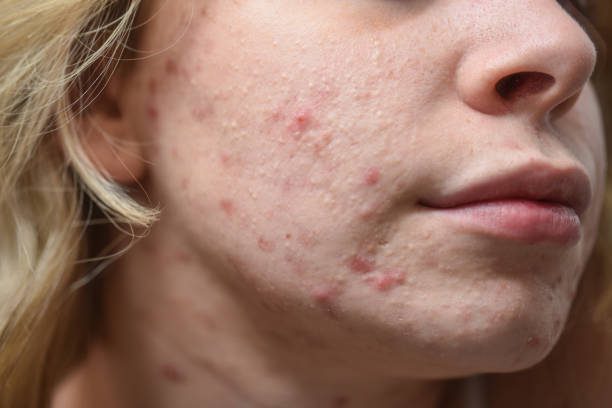

Contributing Factors to Acne Vulgaris
Hormonal Influences
When we grow up, our hormones may make our glands cause follicular dilatation, make skin oily, and cause pimples, and acne vulgaris. The increased sebum secretion, extra oil, and germs can block our sebaceous pores and cause acne. Hormones make our skin’s sebaceous glands produce more oil, known as sebum production, which helps bacteria that cause acne to grow.
Hormonal changes during the month can make acne worse for girls. After ovulation, progesterone goes up and makes more oil on the skin, which leads to pimples due to follicular plugging in sebaceous follicles. Knowing about these hormone effects helps to deal with acne better.
Eating healthy food and exercising can help control hormones and lessen pimples, an acne treatment. Talk to a skin doctor for special treatment.
Genetic Predisposition – Environmental Factors
Genes from your parents can make you more likely to get acne. But things like pollution, skincare products, and complications can also make it worse.
Different genes can make acne worse. Knowing your genes can help doctors suggest the right treatment for your skin.
In my experience, using gentle skincare products helps me control my acne. Avoiding harsh chemicals and too much scrubbing can stop more pimples. Genetics can affect acne, but good skincare habits can help a lot.
Risk Factors in Adults
Causes of Acne Vulgaris in Adults
Adult acne happens when hormones, stress, and genes mix up. Hormones can create hormonal acne by making too much oil, blocking pores, and causing pimples. This usually affects young adults in early adulthood and those having babies because of hormonal changes and adverse effects.
Your parents’ genes can make you have acne when you grow up. If they had it, you might get it too. Some medicines and health problems can make acne worse. Talk to a doctor to help you take care of it with proper management.
Lifestyle Factors
Grown-ups can get acne from eating bad foods like lots of dairy or sugary stuff. Eating more fruits and veggies can help make skin better and lessen acne.
Using harsh skincare products or not cleaning your skin well can make acne worse in adults. Use gentle products made for adult skin to help stop acne.
When I do yoga or meditation, my skin looks better. Yoga and meditation help me feel less stressed and improve my acne.
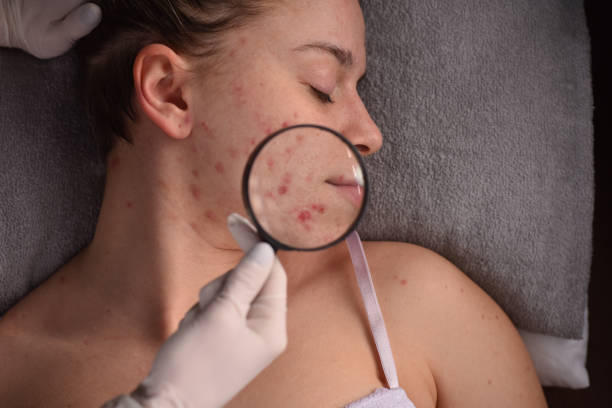

Pathophysiology and Main Causes
Pathophysiology Overview
Acne happens when follicular plugging, also known as sebaceous follicles or pilosebaceous units, get blocked by oil and dead skin, making bumps. These bumps can turn into pimples, whiteheads, or blackheads. It starts with too much oil mixing with dead skin to cause follicular plugging and clog the holes.
Clogged pores make a good home for bad germs that cause inflammatory acne, making the skin red and swollen. These germs cause pimples with pus, making acne worse.
Main Contributing Factors and Pathogenesis
Some things can cause acne breakouts, like hormones changing when you grow up. Your family genes can also make you more likely to get pimples, also known as acne vulgaris. Some medicines can make pimples worse too.
Things like pollution, humidity, and not taking care of your skin can make acne worse. Stress can also make acne worse because it affects your hormones.
I always do my skincare routine to help my acne. I use gentle cleansers and special moisturizers that don’t make my skin worse. Doing yoga or meditation helps me feel less stressed and my acne gets better.
Diagnosis and Management
Diagnosis Methods
To find out if someone has acne, doctors look at their skin carefully. They check the comedo count for blackheads, whiteheads, and closed comedones to see how bad acne vulgaris is. They also ask patients about medical history, past sickness, disease, symptoms, and medicines the person is using.
Doctors look at your skin to see how much oil you have, what’s causing your pimples, and acne symptoms like pomade acne. Then, they make a plan to help you get better skin.
Treatment Options
For acne, there are different treatments based on how bad it is. You can use stuff from the store, get medicine from the doctor, or change your lifestyle. The treatment you get depends on your acne, skin condition, and your health history.
- Over-the-counter treatments
- Prescription medications
- Lifestyle modifications
- Specialist procedures
Over-the-Counter Treatments
You can use special creams for acne with things like benzoyl peroxide or salicylic acid to help clear your skin. Just make sure to follow the directions so your skin doesn’t get irritated.
Personal Experience: I used benzoyl peroxide acne cream, and it helped my breakouts.
Prescription Medications
If regular stuff doesn’t work, skin doctors can give you pills, creams, or oral isotretinoin for acne vulgaris. Pills like tetracycline or isotretinoin help with terrible acne, and creams called retinoids or adapalene are good for mild pimples.
To treat acne, always ask a doctor before using prescription meds to stay safe and get the best results.
Lifestyle Modifications
To help with acne, do more than just use creams, and pills, and establish a skin care regimen. Wash your face daily, stay out of the sun, relax, and eat healthy. These things can make your skin better.
By doing these things every day, people with acne can help their treatments work better and keep their skin healthy.
Specialist Procedures
Dermatologists can do special Dermatological Procedures like peels or lasers for tough acne. Pros do dermatological procedures, therapeutic laser therapy, dermatopathology, and specialist procedures in clinics specializing in dermatology to make skin look better.
Special treatments, including specialist procedures and prescription meds, give more choices for people who want extra help beyond usual over-the-counter medicine and skincare.
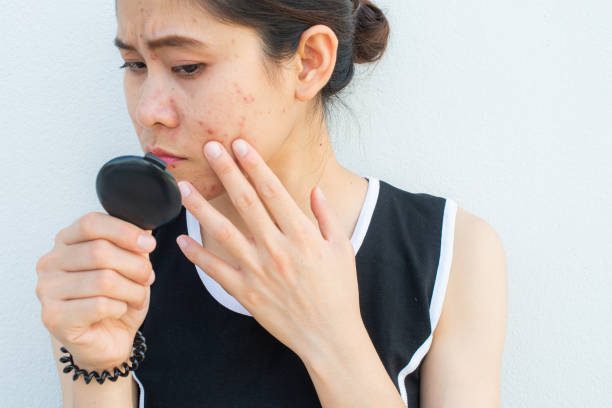

Prevention and Additional Insights
Preventive Measures
To stop pimples, wash your face a lot and keep it clean. Don’t touch your face with dirty hands. Keep hair clean and away from the face.
Eat healthy foods like fruits, veggies, and grains for good skin. Drink lots of water. Relax to handle stress. Exercise to control hormones and prevent acne.
Vitamin Deficiencies and Acne Vulgaris
Not having enough vitamins like D and zinc can make acne worse. Eating foods with keratin and these vitamins can keep your skin healthy. Vitamin D helps your skin glow, and zinc can help calm down acne.
Eat fish, eggs, and milk for vitamin D. For zinc, have meat, nuts, and beans. Ask a doctor before taking new vitamins to know how much you need.
Common Triggers
People want to know why acne happens. It might be because of hormones changing during teenage years and early adulthood, causing acne vulgaris due to Cutibacterium acnes, seborrhoea, and sebaceous glands.
Hormonal Influences
Acne happens when too much sebum production in the pilosebaceous unit blocks pores because of hormones.
Dietary Factors
Some foods like sugary or dairy ones can make acne worse for some people. But it affects everyone differently.
Environmental Factors
Pollution and humidity can make acne worse. Washing your face every day can help stop this.
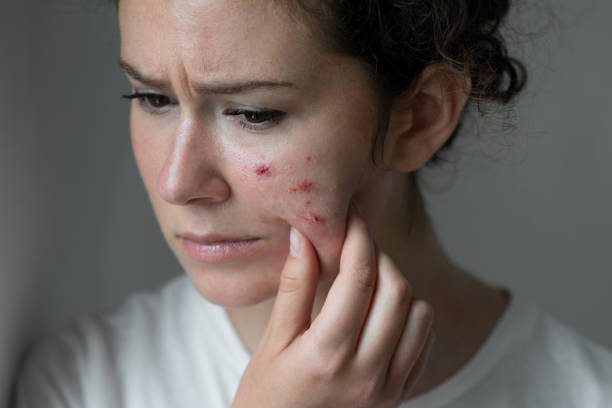

Summary
We learned a lot about acne – types, symptoms, causes, risks, how doctors diagnose and treat it, and how to prevent it. Knowing all this helps me take care of my skin better and get help from a doctor when I need it.
Taking care of your skin is super important for staying healthy. If I learn about acne and act, I can keep my skin clear and prevent breakouts. Let’s make sure to take care of our skin and aim for a smooth and healthy face!
Frequently Asked Questions
What are the several types of acne vulgaris?
Acne can show up as different things on your skin like blackheads, whiteheads, bumps, and big pimples. They need different treatments.
What are the main contributing factors to acne vulgaris?
Too much oil, dirt, and germs can cause pimples.
How is acne vulgaris diagnosed and managed?
To find out what’s wrong with your skin, a skin doctor will check you for acne. They might give you Adapalene, Tretinoin, creams, or pills as a retinoid treatment to help with acne and suggest changes to your daily routine medication regimens.
Are there effective prevention strategies for acne vulgaris?
To stop acne and pimples, take care of your skin, use gentle products, stay calm, and eat healthy.
What are some risk factors for developing acne vulgaris in adults?
Adults can get acne from hormones, medicine, family history, stress, and pollution.


